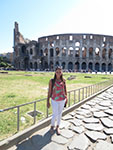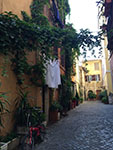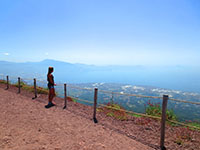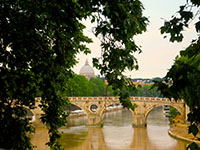![]()
Name: Meredith Fraser
E-mail: mfraser2@nd.edu
Location of Study: Rome, Italy
Program of Study: American University in Rome
Sponsors: Mimi Ravarino
![]()
A brief personal bio:
I am a sophomore Biological Sciences and Italian Studies student travelling to Rome this summer with the generous Summer Language Abroad grant. I spent my older youth years in South Florida learning the Spanish language and have since been studying Italian at Notre Dame. I have Italian heritage maternally and look forward to mastering this familial language as a prerequisite to my eventual life there.
Why this summer language abroad opportunity is important to me:
As an Italian supplementary major, I rely on the classroom learning in South Bend, Indiana to get a glimpse of a world oceans away, familiar to me because of my mother’s heritage and the textbook’s depictions. I know that exploring this world will enhance my language prowess and enrich my cultural development in ways that surpass the limitations of America; the Summer Language Abroad grant will be pivotal in this transformational process.
My mother was raised in the Eternal City, and I know from familial stories that exposure through deliberate daily encounters of the language builds proficient linguistics. Thus, I cannot see my Italian educational experience complete without an opportunity to learn in the nooks of all the cities where this language was born. With the privilege that is my SLA grant, I will grow remarkably in the Italian language and return with an enlightened intellect and newly acquired ease of communication. I have had success thus far in Italian, and the SLA grant will allow me to continue the trajectory toward complete comprehension, an Italian supplementary major, and an eventual position as a medical professional in Italy.
What I hope to achieve as a result of this summer study abroad experience:
With the opportunity provided by the Summer Language Abroad grant, I would like to acquire mastery of the Italian language.
The people before me have made me a young woman of Italian heritage, teaching me tradition. I have made myself a scholar of the Italian language, selecting it as a supplementary major. As for my future self, she will make efficient gains toward mastery with the funds generously provided, eventually seizing complete and lasting proficiency. I look forward to meeting that confident, fluent self in the near future.
In my past experience with learning the Spanish language, intentional and unique immersion in my South Florida Spanish-speaking community led to my mastery. In a similar way, I have prepared a plan to fill my time in the country. A rigorous schedule in class, service at Caritas Diocesana di Roma and Associazione Cultura Popolare Comunità di Sant’Egidio soup kitchen, and weeknight and weekend activities will emphasize linguistic practice, community assimilation, and historical appreciation. I have a passion for this language and a streamlined plan to increase rigor and authenticity of my studies, and the SLA grant makes this plan possible.
My specific learning goals for language and intercultural learning this summer:
o At the end of the summer, I will have developed my speaking, listening, reading, and writing skills in Italian at a level beyond that which I could have achieved through a year of coursework study in the United States.
o At the end of the summer, I will be able to articulate ideas about social and economic disparities related to my service work, cultural comparisons, and day-to-day life with native speakers.
o At the end of the summer, I will be comfortable extending my language usage beyond usual, peer settings and into interactions with new people that I meet in various Italian cities, confident in my linguistic abilities and eager to converse.
o At the end of the summer, I will have had a glimpse at Italian culture from the most real of eyes: those of the needy, the people who depend on the services of the organizations with which I will be working.
o At the end of the summer, I will confidently return to Notre Dame, ready to share my experience and engage in further linguistic and cultural learning opportunities in and out of the classroom.
My plan for maximizing my international language learning experience:
I seek expansion from my textbook’s cultural coverage; I would like an intense language component enriched by a broader understanding of historical, social, political, cultural, and religious aspects of Rome and the surrounding area. I will experience history as I analyze cultural beginnings at archaeological sites through academic excursions.
I also hope to explore individually, implementing lengthy classroom lessons and using the city interactively. The program will link me to guided tours, performances, service, and small-group language practice in my free time. I will be visiting churches and cathedrals, exploring foundations of my Catholic faith through participation in Mass and study of religious art. My service learning endeavors include volunteering during my afternoons at the Caritas Diocesana di Roma (Catholic Charities of Rome), interacting with Italians in the food line, hostel, in linen and clothing distribution, and organizing entertainment, all opportunities to display my cultural familiarity. The soup kitchen Associazione Cultura Popolare Comunità di Sant’Egidio is another organization I hope to assist, and in turn hone my language skills. In addition, I will attend Tuesday night culinary lessons with the Italian chef Andrea Consoli at his restaurant Le Fate on viale Trastevere.
![]()
Reflective Journal Entry 1:
Well, I arrived in sunny Rome on Monday! After leaving the airport, the drive to Trastevere—a region of Rome that literally means across the Tiber river—where I am staying, was full of sights. I can hardly keep track of all the nooks I want to explore. I don’t foresee much time for siestas!
In my apartment are 3 other girls from my Rome university. We are in a building with 4 floors full of Roman families, so Italian conversation and television are heard at all hours of the day. I saw a small older Italian woman in the wooden elevator today closing the manual doors; I hope I can get to know her. My favorite thing to sense so far is the smell of food that wafts from under the heavy wooden doors of some units on our floor. The centrality of food to culture here is immediately evident and remarkable.
On Wednesday, I went to the Roman countryside to visit a friend of my grandmother, Enedina, far away on Via Nomentana. It took 3 bus rides and 2 hours, but my friends from Rome and I finally arrived at her lovely, quiet country villa. Her granddaughter, Flavia, was there, and we talked to her while Enedina was preparing Gemelli pasta all’amatriciana (yummm!!).
After comparing life in the States and in Italy and laughing over some misinterpretations as well as commonalities, we began talking about heavier cultural issues. Flavia became very sharply animated while explaining to me the issues with education in Italy. She said that Italians waste too much money on parades and celebrations, because the cultural attitude toward education is not the same as in the United States. I was a little confused as she rambled about 7 million euro that had been given to banks for no need or reason and then about some type of slot machine the Mafia use to manipulate money. In any case, there seems to be a prevalent hope for change in the aspect of Italian culture that relates to the education system.
Lack of education becomes a problem in a culture, as uneducated people, Flavia said, were uninformed, (due to their lack of education) about societal issues and so did not know to take any action to effect changes. A middle-aged man we met on the bus home agreed with the things she had said and mentioned a movement he hopes will create a more effective education system that would provide opportunities for more people. Last, I spoke with my professor, an older woman from Rome, about her opinion as an educator on education and the culture of Rome. Her words, in English, were something like: “There is no money here so we are failing. There is nothing to do.”
It is interesting to hear from natives these opinions of the problems in a city so admired by many people in the United States. As tourists, we often place Italy on a pedestal of goodness, and so it is for visitors for weeks in the summer. However, when you talk to educated Italians, there is quite a different perspective, it seems. While education is paramount in our culture, it is taken for granted; Italians yearn for change in their system. To hear a concurrent opinion like this one from people of such a large range of ages is stunning. I’m eager to learn more about all facets of this city and country, and I am thankful for the Notre Dame education and educated benefactors that allow me to do so.
Reflective Journal Entry 2:
I’ve only been here a week, and yesterday was the Festa della Repubblica. I was able to learn about it before the celebration. According to the official tourist information, June 2 is the Italian national holiday to remember the 1946 decision by Italy to become a Republic after 85 years of monarchy. That day, the Italian nation was born. Every year on this day, Italy holds a special ceremony that includes the placement of a wreath on the Tomb of the Unknown Soldier, otherwise known as the “wedding cake” in Rome. All Armed Forces, Police Forces, and other related groups take part in a parade, I was told.
Yesterday, Monday, June 2, I was able to attend the Italian Independence Day “parade” near Piazza Venezia with friends from my university. We took Tram 8 to Piazza Venezia without an idea of what to expect, besides the familiar American parade theme of balloons, marching, floats, fanfare, and big crowds like there are at American Independence Day celebrations, for example.
Upon arrival, I recognized a more solemn, quiet, scene than I had expected. There was an assembly of people silently watching the Italian armed forces in formation. After some words and marching by the armed forces, we still hadn’t seen the excitement we anticipated. I approached an older woman and asked, in my most polite Italian, what was next. I asked if we were nearing the end of the celebration. She replied that no, the ceremony had just begun. I asked then if there would be noise or action later, and she assured me that no, it is a more serious celebration of the Republic’s Independence. Evidently, this Independence Day celebration was similar to the description given by the tourist office and very different from ours in America. Parade, I presume, is a versatile word.
After the jet flyover that trailed red, white, and green smoke in the form of the Italian flag, and much more quiet observation of the marching and addresses by government officials, we headed home. It is eye-opening to experience culture among Italians here. There is much to learn from the cultural practices.
Reflective Journal Entry 3:
One night, I went to a township of Rome, Testaccio, located opposite the river from Trastevere and often overlooked because of its location off of the popular routes. Though quaint, it has big and noisy markets with people bustling everywhere. Sometimes it is called the “real Rome” for its beauty and charm.
In the 1800s, Testaccio had become home to much of Rome’s working class and had Rome’s only slaughterhouse. Many slaughterhouse workers were paid in offal, which is traditionally unwanted cow parts such as the tail and stomach lining. This was also called the “quinto quarto”, or fifth quarter. Workers’ wives would take these seemingly inedible parts and transform them with dishes like coda alla vaccinara (oxtail) that are still served today in Testaccio.
Checchino is a restaurant opened in 1887 by Mr. Checchino during the construction of the slaughterhouses in Testaccio. He received a license to cook food just in time for the hungry workers’ arrival and cooked the food they were used to eating, the offal. The third generation restaurant still serves offal on Via di Monte Testaccio, 30. I learned about offal from a friend and visited Checchino to taste it for myself. There, my waiter was able to tell me about its history and significance as a popular dish from the times of slaughterhouse workers. Though I was hesitant to try it, it was actually tasty!
Besides the offal, there is a widespread centrality of food in Italy overall. Food is the main focus of all gatherings. The process of eating is a slow and enjoyable one. Children are sent home from school to enjoy a midday lunch with their families. Females spend all weekend preparing homemade sauces and pasta from flour and water. Fast food is a sin. Food is bought daily by people, as meals are cooked with fresh ingredients. Vegetable and fruit stands are as frequent as the light posts lining the streets. There is even a timeliness taken with coffee, as Italians drink espresso or cappuccino in the bar and do not know the idea of carrying coffee on-the-go as Americans do with Starbucks. Food is considered magic; the chef, a magician. I have been fortunate to be the lucky audience member. The transformation of fresh ingredients is an art form, a gift to the person dining.
All social interaction revolves around food, and the nation as a whole identifies itself with food. Each city, in fact, claims its own cuisine. Food varies from city to city and even within townships of one city. Food is both the distinguishing factor between people of different regions and a reason to share. This attention to pleasure with food is refreshing and delightful, and I am enjoying it.
Reflective Journal Entry 4:
I have been in Italy for four weeks now, but four weeks feels like months. In my little Monteverde neighborhood, I am able to soak up so much of the raw Roman ways and love to converse with my neighbors, especially Antonio at the Supermercato Elite. Whatever recipe I am trying to make, there is something I can’t find in the interestingly-organized store; he always has the time to venture around with me wearing a smile and recommending the best cheese—formaggio—or tomato—pomodoro—for the dish. He’s only a few years younger than my dad is, and I wonder at his presumed abilities in the kitchen; my dad could never help me with a recipe.
As a newcomer (four weeks ago) to this magical city, it is easy for me to recognize differences between here and the U.S. I wholeheartedly embrace this culture, however, even envying it at times. When meeting Romans, I wonder what their viewpoint of my home country is.
For my Professoressa Valentina, the U.S. is a fast-paced medley of people eating a chaotic assortment of cuisines without much appreciation for simplicity or good, old-fashioned traditional cooking. She is a foodie, and to her, the Fast Food Nation could never be home. She gawks at the American way of pre-slicing pizza, as in Italy pizza is served in a circle unsliced. To Valentina, a pre-sliced pizza on her table is a “used” pizza. Someone else has touched it. Growing up in a traditional Italian family and having become a professional gastronome, Valentina has no patience for the American nature of replacing good food with the faster alternative. However, there was one thing she praises about America: efficiency. She says that in Italy, people take breaks from their break, whereas in America, we take breaks from our work. She appreciates the idea of working hard and then having a break before continuing the efficient process. She likes that emails and other communications are answered, and in a timely manner. In Italy, life is much more laid back and less structured.
My Italian friend Erica, who is from Terni, Italy, gave me the opinion of a girl in her 20s. Because we are so close in age, we have a lot in common and often compare certain similarities as well as identify points of contrast. Erica continually makes remarks about certain depictions of America she’s seen on Facebook, like pictures of university parties and music festivals. One day, after describing a picture she’d seen with a distant gaze of awe, she said, “America just looks like a whole lot of fun!” It was difficult to explain that America isn’t one big party; contrary to what people choose to depict on social media, Americans also have real lives aside from their celebrations. Regardless of my explanation, Erica loves the U.S and hopes to visit soon.
This week, I was out to dinner in Trastevere at Dar Poeta with some friends. Next to us were two friends, Emilio and Leo. Emilio had just returned that day from one-year immersion in Massachusetts, USA. He was younger and still in high school; he had been taking classes at an American school in Cape Cod and living with a host family. We talked about food—Chipotle is “his jam”—and culture. Then I asked him what his favorite part about the States was. He thought a minute and then replied, “the sports. I loved the many sports teams across the…. No no! Wait. My favorite part was the nationalism.” I stared at him a minute, trying to understand. He slammed his flat palm to his chest and explained: “Everyone loves America. In my homeroom each morning, I got to say the Allegiance Pledge with all of the others, and that was the coolest part. I felt that I was a part of something we were all proud of”. I smiled and let that sink in. I often overlook something as simple as the Pledge of Allegiance because it is so normal, repetitive, and already understood. For Emilio, this was a sign of loyalty and pride that he doesn’t see in Italy. Of all the things in America, nationalism will now become more central to me, thanks to Emilio.
After so many weeks here in Rome, it’s becoming home-y. I have forgotten many of my ways from back in the U.S. However, it is in these few interactions with Italians on the subject of America that I stand up and mentally recognize the place that I come from, in all its uniqueness and significance. Indubitably, the States are special places filled with interesting people; for now, however, I am enjoying my other home: Rome.
Reflective Journal Entry 5:
After five weeks, I have mastered my morning route to class, which changes every day. Some days I take Tram 8 from Ponte Vecchio (not the closest stop but my favorite walking route) to Piazza Venezia and navigate from there, and sometimes I take a few buses, which are totally unreliable and have no set schedule. It can be a little bit of a hustle to travel here (especially every few days when there are transportation strikes – “gli scioperi”) but it keeps my morning exciting. I also love blending in with my fellow travelers, speaking Italian as I wander, confirming that I’m headed the right way. Surprisingly, I’ve never been lost. The Italians reply to me in Italian with a warm smile, welcoming me in the Roman way. It’s delightful to watch a serious pursed-lip, clutched-bag, traveling statue come to life at the sound of my questioning voice.
On Monday, I arrived successfully at Santa Maria Maggiore. I’m a professional at the bus system by now. At the bar I always stop at between classes, Due Archi. after our usual back-and-forth conversation, the owner asked me where I’m from: “Di dove sei? Non puoi essere americana.” I smiled, blushed even, and admitted that yes, I am an American but study Italian in the States. I never thought being called un-American could be a compliment, but I feel wonderful!
At dinner tonight at Bruno ai 4 Venti, I ate pizza frutti di mare (YUM) and a sweet dessert con fragole. I couldn’t help but interrupt the group of all women eating next to my friends and me. We introduced ourselves, told them we were studying in Rome, and talked a while about their favorite American cities, especially Chicago, and our favorite Italian experiences. They told us a few places to go that we’d never have otherwise known. The natives never fail to amaze me with their hospitality.
Reflective Journal Entry 6:
Rome is home. It seems crazy the transformation I’ve experienced from my arrival until now. On Sunday, we were on our way to Trastevere at the Ponte Vecchio stop (tram 8). A young Italian woman approached my friends and I and started speed-talking in Italian; I wasn’t fully listening. When I tuned in, I realized her questions quicker than the girls with me did. She was asking us where she and her boyfriend could watch the night’s soccer game. I surprised myself as I speed-talked (okay, maybe normal-pace-talked) back to her in Italian a few recommended places. She had no idea how to get there. I gave her step-by-step tram directions, naming the stops as well as streets to take in order to get there. Then, I was able to lead her most of the way. An Italian (clearly not Roman) was following me around. I felt so accomplished.
The next day, it happened again. After dinner at the same restaurant my professor was eating at (da Sergio; she asked how I had found the hole-in-the-wall place), I already felt like a local. Then we were on the n8 late-night bus, and a visitor to Rome had just jumped on the bus, clearly out of breath, map in hand. He described where he lived and asked me to confirm that he was on the right bus. I tried to speak quickly and correctly as I told him that he was headed in the wrong direction and needed to exit the bus. I pointed to the correct stop on the opposite side of the road and wished him luck, again feeling at ease with my sense of belonging. I am no longer the newcomer.
At my neighborhood supermarket on Thursday, I introduced my friends to Antonio. I felt like I was bringing my friends to meet my family for the first time, as up until then, I had been visiting the supermarket on my own. That has been some of my favorite time here: walking home from school, thinking thoughts in Italian unintentionally, and then arriving at the supermarket to share my day with Antonio and his coworkers as well as hear what they have to say. On Thursday, we all talked together, and then got Antonio’s guidance on some meats and cheeses to buy for dinner. I studied my Italian work for the rest of the night.
For finals week, I have been frequenting my favorite study spot more often. In the street level of my apartment is a small cafè, visited by only locals—like every place in my neighborhood. Italians chatter as I read, write, and peep up every so often to peek at the toddler delighting in a Kinder bar beside his grandmother or the workmen who arrive during the late afternoon for espresso. Today, I went to the Conad down the street after to pick up a few food items. The shop owner greeted me with “Sei bellisima”, a comment that might be questioned in America but that is very common in this lovely culture. As we chatted, he made two espresso, and handed one to me. I hadn’t ordered one, nor does the grocery store offer coffee, so I must have looked confused. He urged me to enjoy, saying that when he comes to the States I can offer him one as a gift, too! When is the last time I’ve been given complimentary espresso at the grocery store? Never. I bought the cheese he explained to me that his mother makes at her home outside the city and enjoyed it with the rest of my dinner recipe. I wish that the end of this week didn’t mean that I had to end my hello’s to so many parts of Rome. It has been a culture and language awakening, and I will be back.
![]()
Reflection on my language learning and intercultural gains:
In order to acquire the Italian language and engage in cultural differences, I learned that I had to displace myself from my realm of comfort: first, from the United States, and then, within Italy, from my friends there. Without a blanket of normalcy, I allowed myself to dive in to my surroundings. During the times that I was alone, navigating or wandering, I felt the most explorative and able to connect with the language and culture.
My goals were met in that I developed communicative skills at the fast rate that I anticipated. The immersion in the community of Italians forced me to make language gains a part of every minute of the day. However, I will continue to work on developing my cultural lens and learning about the social and economic components of life in Italy.
Reflection on my summer language abroad experience overall:
After my summer in Rome, I’ve adopted a slower mindset. In Italy, there is no stress, rush, or uptight attitude. Life happens apart from the stressor of time. I’ve also embraced the cultural way of connecting with neighbors and welcoming new people. Americans seem to act more reserved and restrained when meeting people, but Italians have shown me the beauty in openness and relationship formation. Along with this is the centrality of food to Italian culture, especially as a welcoming invitation to be present with others. A meal allows you to learn much about a person and bond with him or her, and I will carry that with me throughout my life. And I’ll surely never enjoy an American triangle slice of pizza again.
As for someone who was preparing to start his or her own summer language study, I would encourage him or her to be open and eager for the opportunity. There is much to learn personally, culturally, academically, and socially when you allow yourself to be present in a new culture, removed fully from that which is comfortable.
How I plan to use my language and intercultural competences in the future:
In the future, I will continue to value travel and language acquisition as sources of personal development. It is not until I can communicate with others and experience their lives that I come to understand my own.
I am currently continuing my Italian studies, and much of what I learn in the classroom relates back to my experiences this summer. In this way, I am able to attain a fuller picture of Italy, making links from different experiences.
My SLA grant experience was a personal, social, and academic transformation for me. From the lost feeling I felt during my first day or two in Rome to the at-home feeling during the last few days, there were many changes. Looking back, grasping the Italian culture gave me the confidence to explore further, whether it is Italian or another culture. It is important to be aware and engaged in different peoples and ways of life, and that is what I plan to do going forward.




